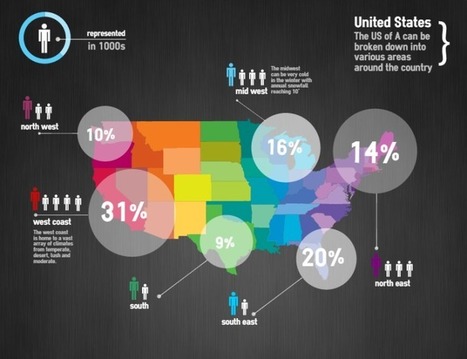 Your new post is loading...
 Your new post is loading...
Here's some heartening news for working mothers worried about the future of their children. Women whose moms worked outside the home are more likely to have jobs themselves, are more likely to hold supervisory responsibility at those jobs, and earn higher wages than women whose mothers stayed home full time, according to a new study. Men raised by working mothers are more likely to contribute to household chores and spend more time caring for family members. The findings are stark, and they hold true across 24 countries. "There are very few things, that we know of, that have such a clear effect on gender inequality as being raised by a working mother," says Kathleen L. McGinn, the Cahners-Rabb Professor of Business Administration at Harvard Business School, who conducted the study with Mayra Ruiz Castro, a researcher at HBS, and Elizabeth Long Lingo, an embedded practitioner at Mt. Holyoke College.
Via The Learning Factor
There's now vindication for troublesome kids everywhere: Studies show that children with more troublesome traits become more successful adults. While we might have driven our parents up the wall, for many of us, our bad attitudes and misbehavior might have made us better entrepreneurs. Of course, that all depends on how well you channel your wild child past into being a more productive adult. You have to transition your problematic behavior into successful traits. And as anyone who knows how good it feels to be bad, that's easier said than done. Here are three things you did as a kid that made your parents cringe, but that can now make you a stronger, more prosperous entrepreneur. 1. Adolescents who talk back are more successful adults.
Via The Learning Factor
"If" improves performance when describing a hypothetical positive. Here's a universal truth. No one likes to be wrong, especially in front of other people. When you're facing a lot of "I don't knows" during a brainstorm or tough challenge, there's a word that can alleviate the pressure of being wrong and open up a pathway of critical thinking: If Tim David, author of Magic Words: The Science and Secrets Behind Seven Words That Motivate, Engage, and Influence, employs this magic word in a very specific sentence I plan to borrow a lot: "What would you say if you did know?" As he explains, deploying the magic "if" allows those you're addressing to think hypothetically, taking away the pressure that might prevent them from volunteering an answer.
Via The Learning Factor
Finding just one extra hour in the working day could be the secret to getting off the hamster wheel. Pinpointing daily time wasters could not only make you more productive, but lead to an empowering sense of control and ability to focus. Transforming from an overburdened worker into an organised leader is all about changing habits,Larry Lucas, director of Frontline Management Institute, says. "It's easy to get distracted by all of the little things that come up – let's face it, there are always things to be done," he says. "But if we focus our time on those little things we fail to work on the more important, although perhaps not so urgent things. Success comes from working on the longer term important things as well as dealing with the immediate urgent things." Freeing up an extra hour each day can usually be achieved by planning your work at the end of each day for the following day, keeping a tight written schedule, cutting out time wasters and delegating work, Lucas says. Take a step back from your working day to spot these inefficiencies:
Via The Learning Factor
The average person spends one-third, or 36%, of their lives sleeping. That means if you live to be 90, you spend about 32 years asleep. "What that 32 years is telling us is sleep, at some level, is important, and yet for most of us, we don’t give sleep a second thought," says Russell Foster, a circadian neuroscientist, in his massively popular TED talk titled, "Why Do We Sleep?" "We throw it away. We just don’t think about sleep." Since sleep and its role in our lives is still mostly a mystery, those hours we rest are, unfortunately, thought of as a waste of time in our always-on, connected world. As the famous saying goes, "money never sleeps," so those who can find a way to "cheat" sleep are accoladed for their "secret to success"—as if getting by on less sleep is accomplished through sheer determination.
Via The Learning Factor
Our brains are weird. Very weird. Take the study showing that just looking at a green roof for 40 seconds can boost your focus, for example. Or the one that found that simply switching the units of time you use to conceptualize a deadline (swapping days for years, say) can help you beat procrastination. These sorts of findings might be odd, but they're also potentially useful. Putting a green plant in your line of sight costs next to nothing. If it can help you get more done with less struggle, why not? So it's worth noting whenever scientists come up with a new way to hack our work routines with so little effort.
Via The Learning Factor
It's virtually impossible to imagine life without learning. We come into the world armed with little more than a bunch of primitive survival instincts, but it’s thanks to our ability to learn that we start adapting to the environment, going from helpless infants into semi-autonomous children before maturing into young adults. Still, when it comes to how we learn, most of us differ considerably at every stage in that process. Now scientists are learning more about that variation and what's behind it. Psychologists have studied learning for over a century, but research in this area has really taken off in the last two decades. Most studies indicate that our personalities largely determine the ways we like to learn. In other words, who we are shapes how we learn. Here's what some of the latest research has uncovered about the most common learning styles and the ways we can learn to our fullest potential.
Via The Learning Factor
Are you dreaming big dreams? The most successful people among us dream big dreams while being awake. They set out to bring their dreams to reality by taking action. They know they have the potential to accomplish anything and avoid putting limitations on themselves. Most important, they don't wait for the perfect time to start dreaming big and making their dreams come true. How can you embark on the journey of dreaming big dreams and making them come true? Here's a helpful guide.
Via The Learning Factor
You've heard it many times, including in this column: Stress is bad. It can damage your brain, screw up your health, travel from person to person, and even kill you. Our modern workplaces are great at creating stress and anxiety. How do we turn that off? Robert Allen Fahey, Ph.D., an academic dean at Computer Systems Institute in Boston, and also a noted psychic, has suggestions for a few very easy steps anyone can take during any workday. These will automatically reduce your stress levels, he says, and help you keep on an even keel whatever comes your way. They're all things you can do at your desk, and most take only a few seconds. Here's his list:
Via The Learning Factor
Seemingly out of nowhere, strange interview questions like, “If you were an animal, which one would you want to be?” or “Tell me about your most awkward moment,” have become surprisingly popular with hiring managers. As if the interview process wasn't stressful enough. So, what can you do when an interviewer wants to hear about your most creative Halloween costume? Here's a four-step plan to help you avoid that deer in the headlights look.
Via The Learning Factor
.Relationship capital isn't built quickly or easily--so here's what you can do to hone your skills
Via The Learning Factor
The cover letter is one of the few documents that nearly everyone will have to write at some point in their life. It has been said that the CV is possibly the most important document you will ever write and if this is the case then arguably, the cover letter could be a close second. The good news is that whilst it might seem complex, in truth it is a just a combination of basic principles that need to be included and followed.
Via The Learning Factor
Where can you find free, good quality images that are cleared to use for your blog posts or social media content?
More and more, you can find images online that allow for use on your blog, or in any creative work, without copyright restrictions or having to pay for licenses.
Searching for stock images can be a difficult and time-wasting task. So take a look at these websites to save you time and possibly frustration.
Via The Learning Factor
|
Emotional intelligence is the prerequisite to great relationships. Here's how to teach kids to develop them. Step 1: To be happy and successful, they need to develop great relationships. Step 2: To develop those relationships, they need adequate emotional intelligence. Step 3: To develop emotional intelligence, it helps if their mentors (especially their parents) model good behavior in love and partnerships. 1. Teach them to "turn toward." Relationships are dynamic. They're made up of an uncountable number of small interactions. Julie and John Gottman, a husband and wife team of psychologists who are experts in this area, describe these interactions as "micro-behaviors" and "bids for attention."
Via The Learning Factor
What Your Brain Does When You're Criticised At any given time, brains are subconsciously scanning the world around us for dangers to defend against—ready to launch a fight, flight, or freeze response that will protect us from predators or poisons. But the brain doesn’t just guard us against physical threats. Research has found that it also goes on the defensive in response to things that threaten to undermine our social standing and safety, including interactions that make us feel even mildly rejected or incompetent. Since even being glanced at askance by a stranger can be enough to trigger our defenses, you can bet that receiving critical feedback is pretty likely to spark a fight, flight, or freeze response.
Via The Learning Factor
We spend an awful lot of time in school throughout our lifetimes, diligently studying and cramming and writing exams, all in the quest to be more intelligent human beings. How how much time do you spend on your emotional intelligence? If you're like the average human being, the answer is probably: "Um, not much." That's too bad, because according to researchers from Rutgers, there are 19 different ways emotional intelligence contributes to the bottom line in any work organization. Emotional intelligence guides our ability to deal with others; to understand their emotions, as well as our own.
Via The Learning Factor
About a decade ago, some early scientific research suggested that playing memory games could increase "fluid intelligence," which is the capacity to solve problems in novel situations, independent of acquired knowledge. A spate of apps, books and classes resulted, all claiming to make people smarter. Unfortunately, later studies proved that "braintraining" (as it's sometimes called) has no effect on your general intelligence. The most recent research in psychology and neuroscience, however, has found five effective strategies for improving your intelligence. Some of them may surprise you:
Via The Learning Factor
Does your day-to-day life reflect who you truly are and aspire to be? Have you simply drifted into careers and relationships, going where events led you, or have you intentionally chosen the life you have? Could your life be happier and more fulfilling? What would you have to do to make that happen? You can find some inspiring and very motivating answers to these questions in TED talks about life hacks. This group of talks, most of which last about 10 minutes, will help you rethink how you make choices about nearly everything. And they may set you on your way to a more fulfilling, more satisfying life.
Via The Learning Factor
You've quantified your bullet points, you've curated your skills section, and you've proofread it from top to bottom. Sounds like your resume's all set to go, right? Almost! There's actually one more step — and that's putting all the sections in the correct order. Like with everything job-search-related, this should be tailored to the position and your specific situation. To give you an idea of where to start, here are four great ways to organize your resume depending on where you are in your career.
Via The Learning Factor
You might not like to call yourself a control freak but you sure do like to know where events are going and feel that you have a handle on all the eventualities. Generally, this isn't a bad way to operate, but if the description above sounds like you, you're also no doubt aware of the downsides this sort of personality. Try as hard as you like, life will still serve up surprises and frustrate your constant desire to be in control. And that can be stressful. So is there a better way? If you're prone to keeping a firm hand on events, can you adjust your thinking to be less stressed when you sense control, as it inevitably does, faltering? New research out of Johns Hopkins University Carey Business School and Wake Forest University suggests you can. The study compared the effects on mood and well being of two approaches to uncertainty called "primary" and "secondary" control.
Via The Learning Factor
Despite the fact that hiring managers now ask for a variety of application materials, resumes are still an extremely important part of the process. And because they’re so important, people usually feel the need to use old-fashioned, stilted, and even cliché language when writing them. While this might not sound like a huge issue, take a moment to remember that your resume is just one of many that are being reviewed for the position, often times, by just one person. If the person reading it can’t understand what you’re trying to get across, or is mildly annoyed by your fluffy word choices, or is getting déjà vu from a similar resume, you have a problem. Remember it’s the hiring manager’s job to skim your resume, not to read between the lines and decipher what makes you unique. To make sure you don’t suffer from language that will get your resume placed in the “no” pile, remove these six words from your resume.
Via The Learning Factor
No matter how much time we spend trying to optimize our inbox — from batch checking messages to adding bells and whistles — email takes over our lives. Looking at my stats from last month, I received and processed over 10,000 emails (eek!), so finding the right way to manage all this online correspondence has been critical for my day-to-day sanity. Turns out, though, the "right way" to manage email depends a lot on your own personal style. I've rounded up some of the most popular and successful strategies so that you can decide which one is best for you.
Via The Learning Factor
Now that LinkedIn is 12 years old and has more than 300 million members, most professionals have figured out how to set up a profile and build connections. But with ever-increasing numbers of hiring managers and recruiters using the site to hunt for job candidates and potential employers routinely checking LinkedIn before they make hiring decisions, it’s worth reviewing your profile to make sure it does you the most good. Here are seven basic steps you can take to make your LinkedIn profile more powerful.
Via The Learning Factor
Data is crucial. However, displaying a chunk of plain data can be monotonous. Infographics visualize plain data and make it visually more appealing. Data turned into infographic has a higher potential to go viral and be effective. While many of us are designers who can design amazing infographs, Infographic Generators can come in handy to Designers and non-designers alike. They can be a time saving resource.
Via The Learning Factor
There are a lot of beautiful tools on the internet – here are 300+ of them that are awesome and – best of all – free to use.
Via The Learning Factor
|



 Your new post is loading...
Your new post is loading...





















































Women whose moms worked outside the home are more likely to have jobs themselves, are more likely to hold supervisory responsibility at those jobs, and earn higher wages than women whose mothers stayed home full time, according to research.